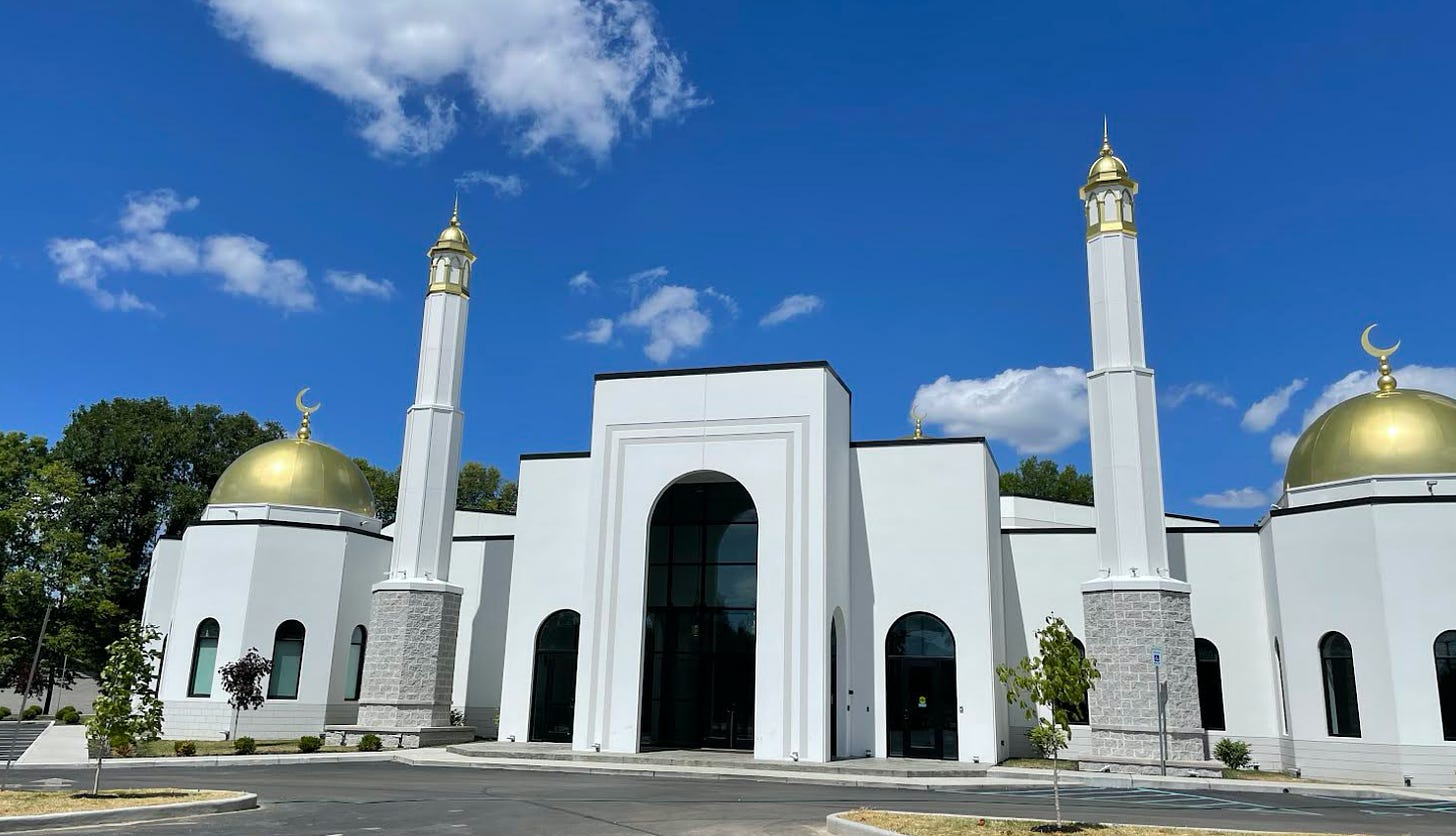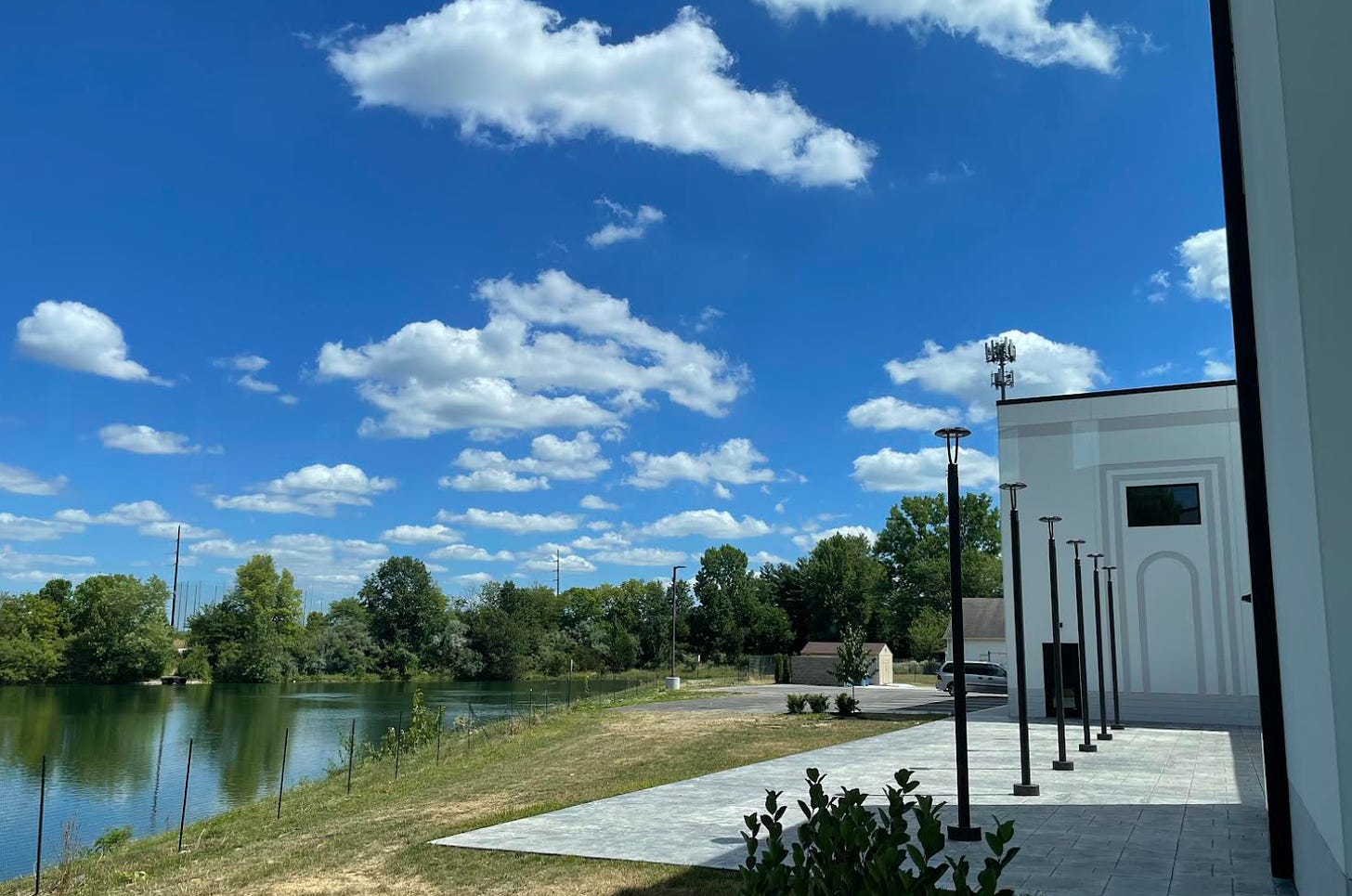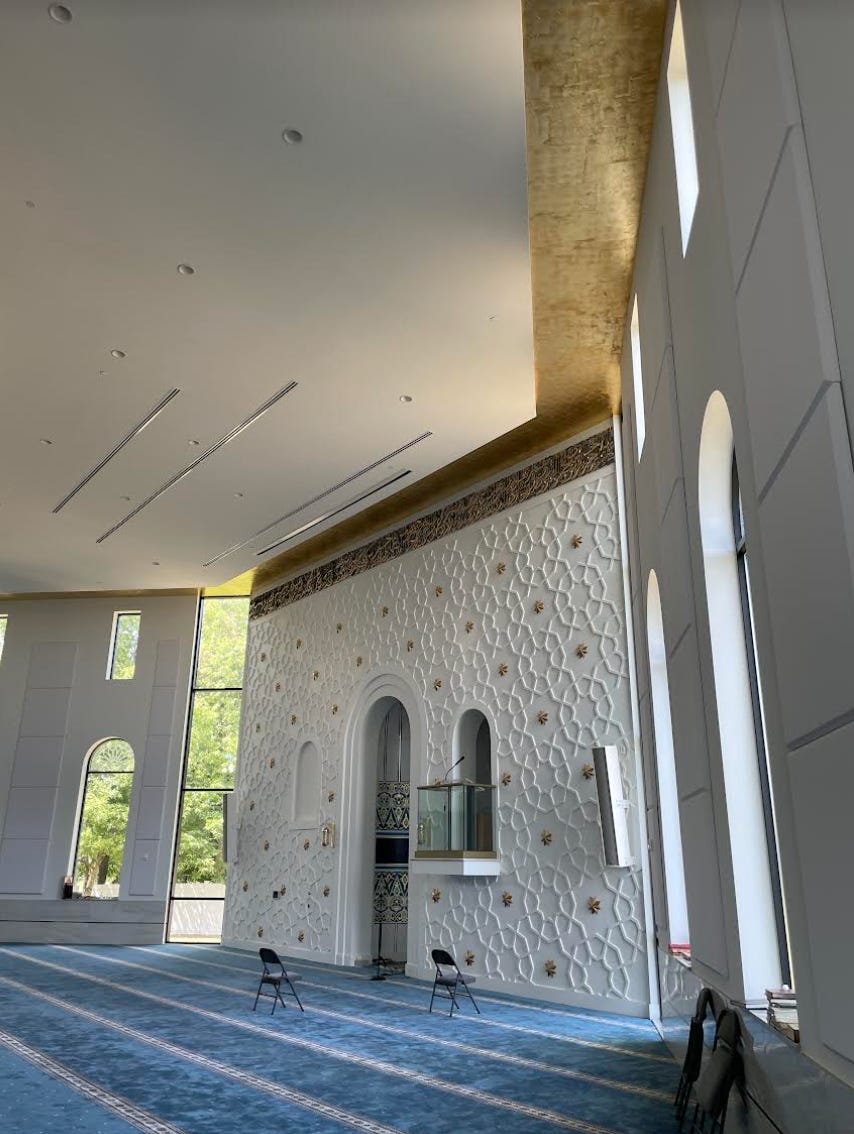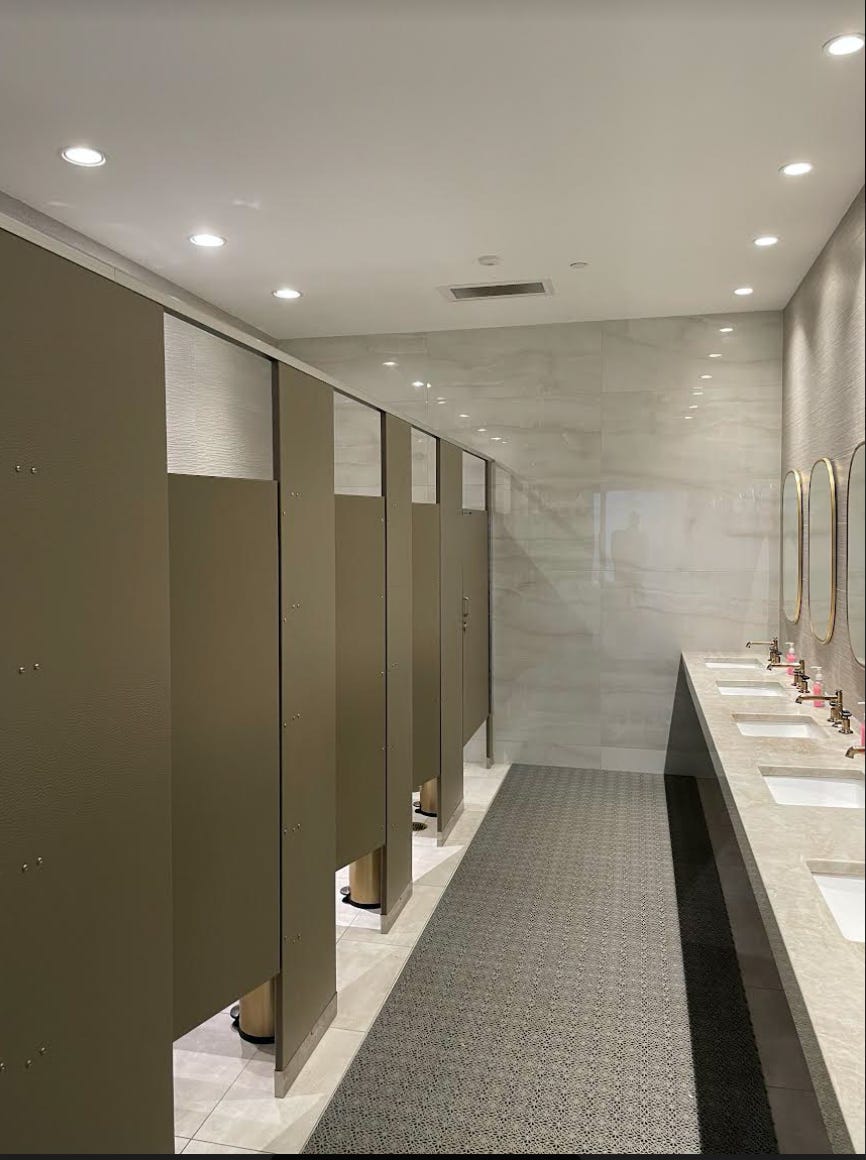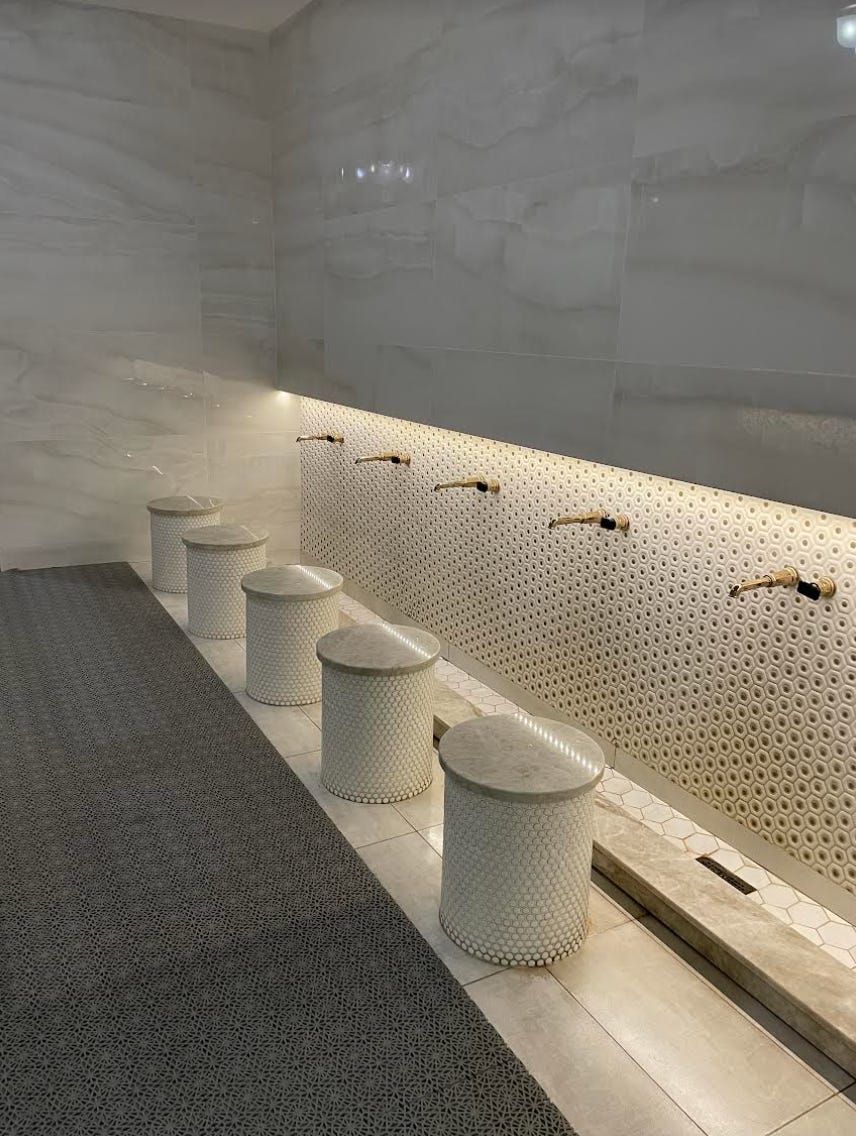One of the most fantastic things about America is one of the most challenging: America is just really, really, really huge. It’s hard to get a sense of the scale of our continental country. I grew up and spent most of my life in the Northeast, which is pretty dense, compact, and littered with cities and riven by states. If you drive four hours in New England, you’ve probably hit several states and almost Canada.
If you drive four hours in Ohio, you might still be in… Ohio. I know this because this has happened to me, and sometimes it causes me to lose my mind.
Because I love driving in theory. Less so driving one thousand miles in practice.
On Monday night, I joined a small group at Madison, Wisconsin’s A Room of One’s Own for a conversation about Two Billion Caliphs. After the discussion—blame my age, but I never thought to take pictures, for which I’m still kicking myself—I chatted with the folks in attendance, some of whom it turned out I knew, in surprising ways. (American Islam has only so many degrees of separation.)
One attendee asked me when I’d gotten into Madison. I explained that I’d left Sunday night from Dayton, where I was attending a janazah (funeral) service (which I intend to write about separately), cleared Chicago, spent the night in Schaumburg, Illinois, where a family friend who’s practically family comped me two rooms at his hotel in a wonderful instance of serendipitous generosity.
So please also consider this a strong recommendation for Schaumburg’s brilliantly convenient Hampton Inn & Suites, right outside Chicago in the Golden Corridor.
They’ve got a nice indoor pool, a great gym, and vast, modern, comfortable rooms, and they’re close to everything you’d need, like a Target (food stocks for the trip), Portillo’s (because I’m in Chicagoland), a huge shopping mall (America’s tenth-largest), great access to major highways, Starbucks (caffeine is not a sin) and even a Nissan dealership, because of course my key fob battery had to start fading in rural Indiana.
Long story short, I got a badly needed six hours of shut-eye and headed out the next morning for America’s Dairyland, which I’d only been to once previously. But I feel a soft spot for Wisconsin, because my father’s first connection to American culture was Muhammad Ali and then Kareem Abdul-Jabbar, who of course started with the local Bucks and ended with the Los Angeles Lakers, which team I still cherish.
Also: The Lakers started in the Midwest, too: Detroit and then MPLS.
Back to the story: “All in all,” I said, “seven hours, give or take.”
“Oh,” he said, visibly relieved. “That’s not bad.”
In my almost two years of living in the Midwest, this qualifies as one of the most Midwest things I’ve ever heard. In the northeast, the world is often imagined to be located between northern Virginia and suburban Boston, and there’s plenty of cities, institutions, airports, and, well, most everything, tucked into that span of some 500 miles, which distance we’d never cover in one trip.
I’d done the same in a day, and he thought it reasonable.
I laughed and called him out. He laughed, too.
But I appreciated the journey even as it depleted me, because a lot of it was entirely unfamiliar to me—Madison was cool, and I’m hopeful I can go back and spend more time there—or insufficiently familiar to me (Chicago is one of the nicest and most beautiful cities I’ve ever been to, ever; why don’t we spend more time there? Oh, A: because life)—and yet that’s only part of the Midwest. It just goes on and on and on.
The Midwest is on a far vaster scale than anything I’m used to and that fact I’m still getting used to. On my way back though, I confess to approaching utter exhaustion.
Monday night I made it back to Schaumburg before midnight, rested, and resumed the next morning. But with a bad back, and a tall build, it’s hard for me to sit in a car for long stretches. I thank Allah and our elected representatives for reasonable speed limits, but still the ribbons of asphalt still cause you to kind of lose your mind, and you’re caught between needing to get home.
Versus needing to stand, stretch, and look at anything else. I needed a break.
I decided to stop for dhuhr and ‘asr prayers in Fishers, Indiana, an expanding suburb of Indianapolis—which metropolis, very much like Columbus, Ohio, has simply exploded in size these past few years, a fact few of us beholden to the narratives of coastal primacy would be aware of (can you believe Columbus and Indianapolis are each bigger than, say, Seattle, Boston, and San Francisco?)
Why Fishers specifically, though?
I’d heard Fishers was home to a fine new masjid, just two hours from our home, Al Huda Foundation, and also I had to pray; regrettably, I know very little about this community (except that they played ICGC, our local masjid, in a regional basketball tournament). That made what I found all the more overwhelming, a structure more beautiful than even my impromptu images here suggest.
But, of course, as beautiful as a building is—and it is undeniably lovely—the building is the container. What is contained? And for that, I need to and want to learn more, not least because they are so proximate, so close to us, inheriting and continuing a pride of place that elevates not just the Midwest, but especially Indiana: The home, for example, of ISNA. Or North America’s first MSA.
So who worships here? Who shapes and runs and grows this place? How did they get here and what do they want to do next? Can we learn from them—and do we have something to offer them in return? These are questions to which I hope I find nuanced and meaningful answers, as I become ever more acclimated to and, God willing, connected to the communities and geography around me.
Also, I’m just going to say, given the woeful conditions of the Ummah’s bathrooms—a problem that sometimes vexes America as well—can we all just pause and praise?
Because if you’re going to take your socks off, you want to feel cleaner after than you did before. Because accessibility in a facility matters. Access for all.
I did not, for obvious reasons, enter the women’s space, but from what I could glean, it included a a large balcony overhanging the men’s prayer hall, with a glass barricade about waist-high; there were stairs and elevators to this second floor as well as ample seating areas beyond, reserved for women, and vast shoe racks.
The women’s sections appeared just as finely crafted as the men’s spaces, just as clean, and quite spacious (and, as far as I can tell, there is one main entrance to the entire worship area, for men and for women.) Does that extend to the masjid’s activities, governance, and outreach?
As I said, I cannot comment on any of that—I was a man stopping by to pray and to play the regional tourist. There’s also a social area between the prayer hall and the indoor basketball court (a very fancy one, by the way), which I saw young men and women playing on at the same time, which made me happy.
I left, in other words, eager to get more engaged.
The history of Islam in the Midwest is deep, dating back to what may have been the first mosque in all of America, or at least the first formal one we still have access to. It’s cheering to know that many of these communities continue growing, shaped by people who come from nearby and come to Islam or who come from the Muslim world and come to America, and lots of them (us) keep coming.
And while our Muslim communities confound and vex us from time to time, as we struggle with the enormously different perspectives and experiences and predilections each of us bring to the table, our injustices and inadequacies, still much the same can be said for this remarkable country, which certainly needs repair, but also deserves a moment (and much more) of gratitude. Just consider the trajectory of the last few days.
For on Monday night in Madison, we sat on a patio outside a proudly progressive bookstore, which had invited me, the author, whose views and indeed whose book itself makes the case for Islam’s decidedly conservative take on certain questions (even as I take liberal views on other issues, and beyond that see the enmeshment of faith with state skeptically); we disagreed, yes, but we inhabited the same space.
That is what maturity requires. And democracy too.
There’s no democracy without maturity. And incidentally a healthy faith can help you grow up instead of just growing old.
And so I thought, as I finished this epic journey, eager to be home, to see my family, to lie on my bed, and yes, to use a bathroom, that when we zero in on Islamophobia, when we indulge a narrative of victimhood, we have a radically incomplete and harmful picture of ourselves and our abilities. Because yes this country has sometimes been shockingly inhospitable to Muslims—and to plenty of other Americans.
There’s no denying that.
But neither is there denying that we’ve been here for centuries, we’ve thrived here for decades, we’ve built institutions, shaped the landscape, and changed the very logic and imagination of America. The last road trip we took carried us out of the Midwest and into the South, to Louisville, where we traced Muhammad Ali’s life and legacy, from a modest home where he was born to where he lies waiting to meet his Lord.
The city’s airport is, quite amazingly, actually Muhammad Ali International. If you haven’t watched UPF’s The Great Muslim American Road Trip, which I posted about some days back, consider this a gentle prod. One of UPF’s core members is from the suburban Cincinnati community, and it’s not surprising that their road trip starts in the Midwest, where the bigness of America becomes awfully apparent.
In a recent op-ed for The New York Times, Tish Warren celebrates (among other things) Barnes and Noble, and apologizes for her past hostility to the store. (Incidentally, there’s one such store close to said Hampton Inn, another argument for its desirability.) She urges us to see the value in the physical, the material, the tangible. To interact with each other, with ideas, with stories, and in communities.
For there is no faith without community—and no community without some kind of faith. Something that asks us to see beyond ourselves. Because how long, really, are we here for? In this life, movement is made possible by health, by wealth, and by circumstances—say, citizenship—often outside our control. And then we pass on. But that bigger and ultimate journey is helped or hindered by different tests.
Different metrics.
Tests of character, of conscience, of conviction. And yes: Community. Were we there for each other? Did we take care of each other? Did we build real and actual spaces where we could meet—and then go there and celebrate with each other and mourn with each other? “Service to others,” Muhammad Ali once said, “is the rent you pay for your time on Earth.”
I ask God to bless the wonderful people who made this trip possible for me, and for their generosity to count in their favor in this life and the next.
I ask God to forgive those who passed and to take care of those who they left behind. To help all of us, wherever we are in our journey, to remember we are travelers.
I ask you to say amen, too.




